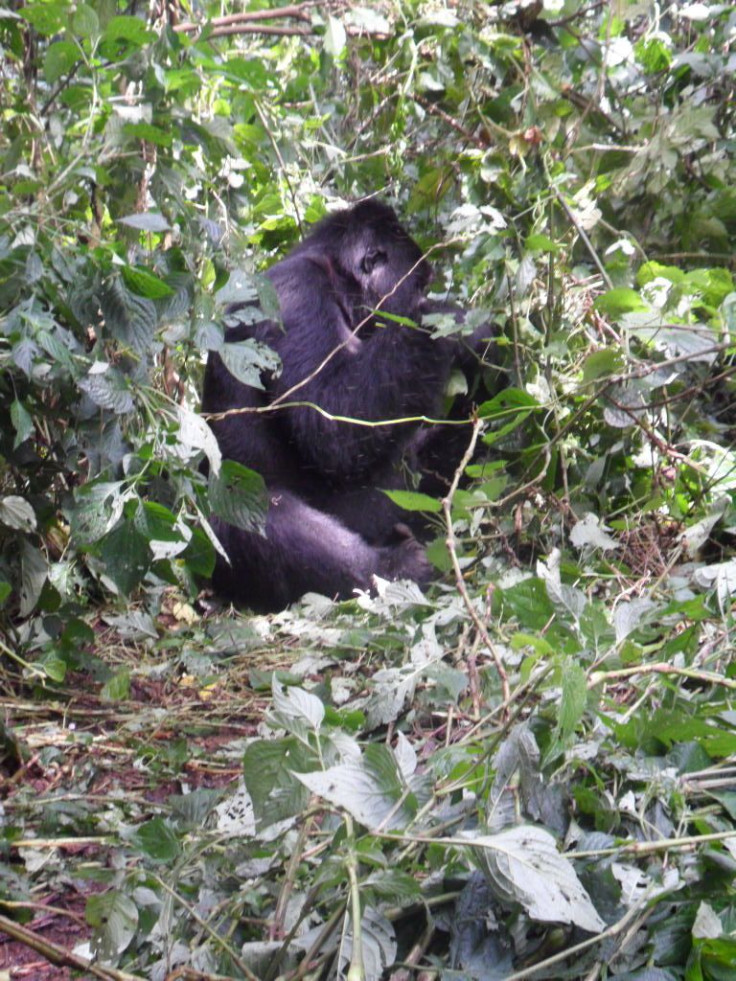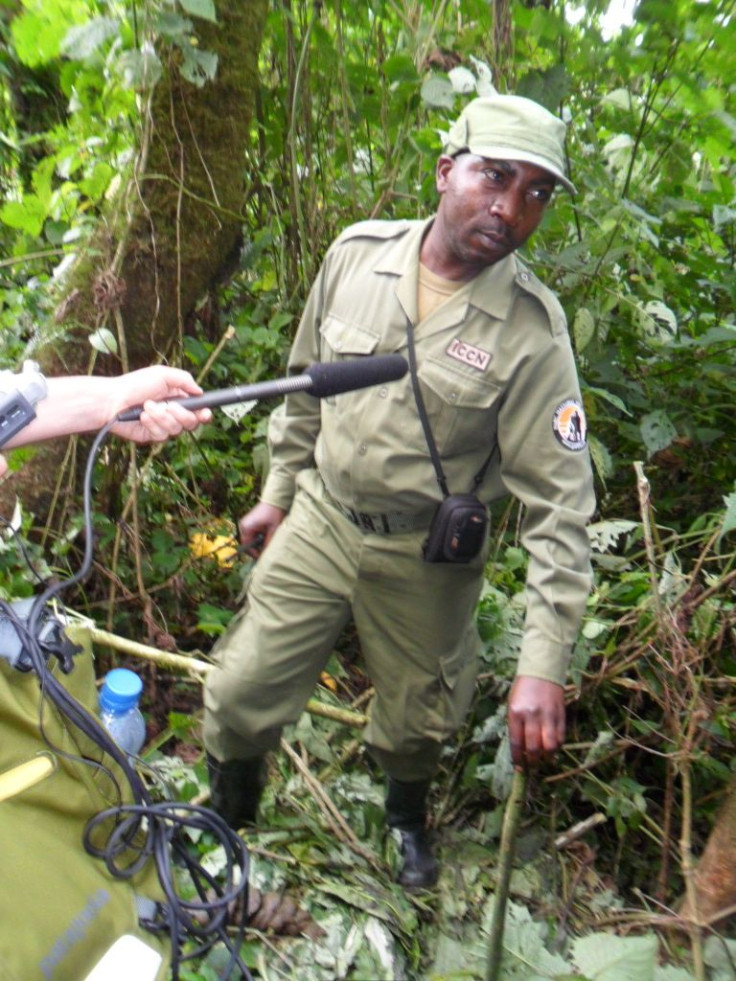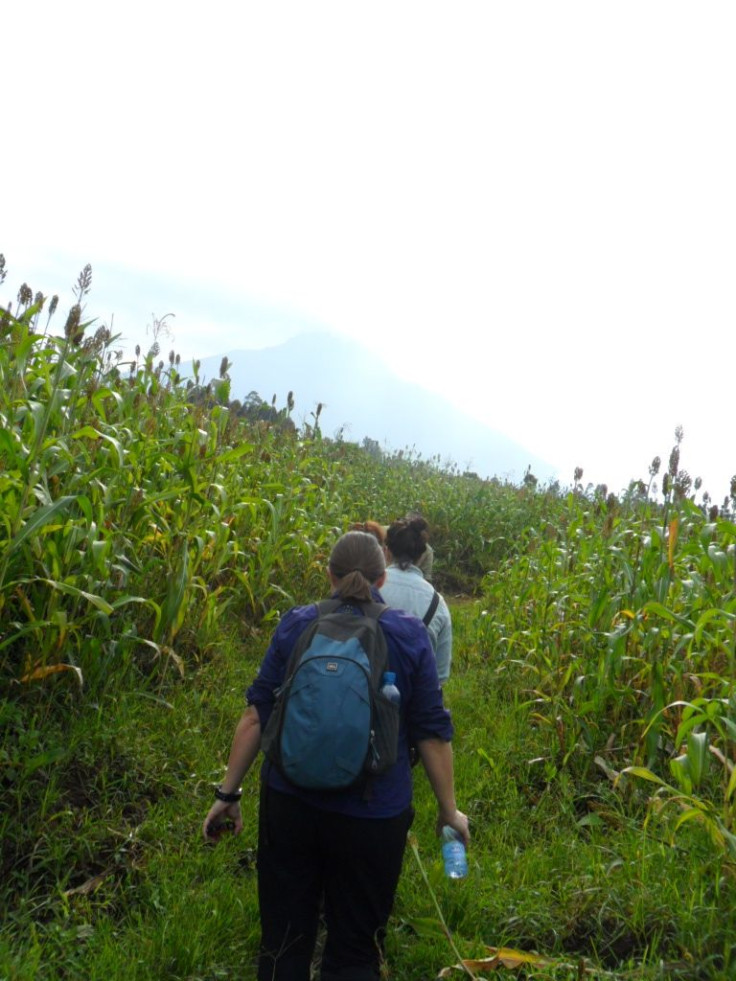Central Africa's Ecotourism Set To Rebound, Though Lingering Conflicts, Proposed Oil Drilling Endanger Gorillas

RUMANGABO, Democratic Republic of Congo — For more than a decade and a half, armed rebels were the main threat to this country's famous Virunga National Park, and though the park is rebounding, the threat of conflict persists, and now, environmentalists fear an oil project could be even more destructive.
Soco International PLC, a U.K.-based oil company, has been granted exploration rights within an area that overlaps the park just north of a region that's home to Virunga's mountain gorillas. While Soco says a well-managed oil exploration project can help lift local residents out of poverty, opponents worry that in such a fragile environment, Soco's work will only exacerbate a tense competition for resources in the recovering preserve.
Since the beginning of the Second Congo War in 1998, fierce fighting between several rebel groups made Virunga – a Unesco World Heritage site with a mix of snow-capped mountains, savannas, marshes and tropical rainforest – too dangerous to visit. More than 130 rangers have lost their lives protecting the park and the elephants, hippos, gorillas and other wildlife suffered.
The region has become considerably more stable since the M23 rebel group surrendered in November. Park officials say the mountain gorillas' home, the Mikeno sector of the park's southern region, is secure, and with peace, it's ripe for tourism. Environmental groups worry the budding ecotourism industry and the natural resources it will tap could be threatened should Soco drill for oil.
Tourism at Virunga is already a tough sell, despite the park's stunning offerings. For now, all but the Mikeno sector of the park remains closed to tourists. More than 3,000 tourists visited the park in 2011, and more than 5,000 were expected in 2012 before tourism was suspended. That was up from zero in 2008, when many thought the park was a lost cause due to the destruction brought on by DRC's second war.
Based on the success of neighboring countries, park officials hope to generate millions in tourism revenue from Virunga, Africa's oldest national park, which was created by Belgium in 1925. Emmanuel de Merode, Virunga's park director, points to Rwanda: Fifteen years ago, the country best known for its Hutu-Tutsi genocide was in a similar situation with a "very bad reputation for security" and "an absolutely tragic context," as de Merode put it. Yet in 2010, he said, Rwanda's tourism sector generated $430 million, most of it through visitors who came to see mountain gorillas.
"And Rwanda doesn't have 10 percent of what's contained in Virunga National Park, in terms of different products that you can offer visitors," de Merode said. "There's no good reason, there's no acceptable reason why Congo can't do the same, why it can't do better."
Virunga, which spans three countries – DRC, Rwanda and Uganda -- encompasses a spectacular assemblage of African landscapes and wildlife, boasting the most numerous species of birds, mammals and reptiles of any national park in the world, de Merode said. Across 3,000 square miles, tourists can take in glaciers in the Rwenzori Mountains, stare down into a lava lake atop the Nyiragongo volcano, gaze at elephants, antelopes and buffalo in the Rwindi Plains or watch the hippos in Lake Edward and its tributaries.
While many Western wildlife tourists are more familiar with the Serengeti in East Africa and the Okavango Delta in Botswana, "for the Francophone world, in Europe and elsewhere, the mecca for wildlife safaris in Africa was Virunga," de Merode said.
If you're a tourist who wants to see Congo's famous mountain gorillas in their natural habitat, there's only one way to do it: Go to them on foot. No horses; no vehicles; just you and the gorillas, accompanied by trained park rangers, of course.
Reaching Virunga takes two hours on bumpy, potholed roads from Goma, the unstable, bustling capital of North Kivu Province with a heavy U.N. presence bordering Rwanda. I made the trip last month with a delegation of journalists from the International Women's Media Foundation, a Washington, D.C.-based nonprofit that offered us fellowships to report on new narratives from a troubled region. Joined by three local fixers and several armed park rangers, we ventured forth on a steep 45-minute hike through fields of beans and bush. Along the way, villagers welcomed us with a kind "Jambo!" ("hello" in Swahili), which initiated a series of call-and-response greetings.
With heavy breaths, we arrived at a ranger post amid a cool breeze and surveyed the green surroundings. "That's the nice thing about here," said Virunga project manager Beau Davis. "The elevation is high, but the weather is quite pleasant year-round."
Innocent Mburanumwe, chief warden of the southern sector, offered clear instructions before we trekked to the gorillas. "Sometimes, the silverback can just charge, beating his chest," Mburanumwe said. "Please, don't run."
"Don't run?" one woman asked.
"Don't run," Mburanumwe reiterated. "He can just do that, showing that he's very strong, or just to threaten you, seeing if you have to run, but please don't run."
We later learned that a ranger once had run; he wasn't grabbed by the gorilla but instead "squeezed by his teeth," Mburanumwe said.
"We call that biting," another woman answered.
Stay calm and quiet, Mburanumwe said. Follow your ranger. If he says to crouch down, do so immediately. Wear a mask over your mouth to avoid the transmission of illness. Avoid eye contact. Turn your camera flash off; it can make the gorillas aggressive. Tuck your trousers into your socks.
"Inside here, we have these ants that don't respect anyone," Mburanumwe said.

Hacking a path with a large machete, Mburanumwe led us into the dense bush. He pointed out a stick rangers had used earlier in the day to mark the location of the gorillas. When he saw a large pile of fresh scat, he said, "We are closer." Then, we heard the distinctive grunts, a throaty "Ahhh hmmm." Ahead was a large silverback from the Humba family, one of two families Mburanumwe and others have spent the past two years habituating.
Shrouded in dense foliage, the silverback was still and disinterested. Mburanumwe echoed an "Ahhh hmmm" to signal friendship. Wide-eyed, I reflected on my position: Here I was, deep in the bush of Central Africa, standing only few feet away from a husky 400-pound primate. Let's enjoy the moment, I thought, and let's look back on it as soon as possible.
We crouched down and steadied our cameras. The silverback, which was eating leaves, took note of our group, stood on all fours and slowly turned around. With his backside still facing us, he took a long, leisurely pee, then ambled further up the hill. Mburanumwe told us to follow him.
The silverback led us to the rest of the Humba, a family of 16. They were playful, some beating their chests and wrestling. Others were quiet. And one was a little unpredictable.
When a colleague extended her arm to shoot a picture, she piqued the curiosity of the feisty juvenile, who made a bold play for her camera. Mburanumwe shooed the youth away.
When I came face-to-face with a young gorilla, I moved closer to Mburanumwe, like a child shadowing a parent. I crouched, averted my gaze and feigned lack of interest. Mburanumwe reassured me that it was OK to use my camera. With a shaky hand, I snapped blurry pictures.
Afterward, Mburanumwe described the Humba as calm and happy during our visit, which was a far cry from the introduction Mburanumwe had experienced two years ago, when he and other rangers began habituating them through daily visits.
"At the beginning, it was very, very aggressive," Mburanumwe recalled. "And you see that the silverback is coming, he's charging, he's crying." Mburanumwe paused. His voice softened. "Now, he's changing. He's very quiet. He's very calm. You can just approach him. He will not move far. But at the beginning, ah, I can say, it's a problem."
Now, Mburanumwe considers the Humba his friends.
"I love them when I get into the family," Mburanumwe said. "They are trying to see and watch on you. Trying to scare you... Know that they are very clever."
Clever? So, too are the rebels, and in their case, Mburanumwe's interactions with them haven't improved. He's exchanged fire with rebels in the bush, yet the prospects of doing so again don't scare him. When asked whether he is afraid, or his family is afraid, he repeats over and over again that he can't be afraid because he is trained.
Being a ranger at Virunga is akin to being an armed combatant with more than one mission. Yes, you're protecting endangered species, but you're also policing the park from poachers and armed groups, the biggest threats to the gorilla, Mburanumwe said.
When de Merode became director of Virunga in 2008, General Laurent Nkunda, leader of the then-National Congress for the Defense of the People, or CNDP, a rebel group that would morph into M23, controlled the Mikeno sector. De Merode successfully negotiated with Nkunda to allow rangers back in. Asked how he did it, de Merode said, "There aren't many people in the community whose parents or grandparents aren't somehow involved in the park, so it resonates. It goes above the politics of the moment."
Nkunda was arrested years ago, but there are other rebel groups, and ongoing threats. Just last month, in another section of the park, a ranger was killed and three others injured during a confrontation with the FDLR, Democratic Forces for the Liberation of Rwanda.
When a ranger dies, the community gathers to support the widow and mourn together.
"That's what keeps people going here more than anything," de Merode said. "Being a ranger with all the risks and the hardships that go with it, also has that safety net and that shared existence with other people."
In 2012, tourism was suspended, and villagers subsequently evacuated amid firefights between government forces and the M23 rebel group, which pushed toward and eventually captured Goma, albeit briefly.
Since M23 surrendered in November, the area has settled down, and the park is moving forward with its economic recovery plan, of which mountain gorilla tourism is only one component. Still, the recent ambush by FDLR occurred near the Nyiragongo volcano, which park officials were preparing to develop for tourism. Today, eight airtight A-frame cabins stand ready to welcome visitors after a daylong hike to the volcano – once the area is secured.
"It's cold and windy up there," said Davis, the project manager. "It drops to around freezing at night. Very windy. When you're on the very lip, for example, silly enough to dangle your feet over the edge -- some people are -- you can feel the warmth of the lava lake below you."
The Virunga Alliance, a partnership between the public, private-sector institutions and the state, aims to develop tourism, along with other sustainable development initiatives in energy, fisheries and agro-industry. Charcoal, for example, is both a local necessity and a source of great controversy; its extraction represents a $35 million illegal industry, according to de Merode.
By 2020, the Alliance hopes to complete work to supply energy to poor households by building several micro hydroelectric plants with scattered stations along the slopes of the Rwenzori Mountains that will generate 94.1 megawatts of power, supply energy to more than 1 million homes, and create 60,000 jobs. Because the plants would not rely upon dams, their environmental impacts are expected to be minimal.
But the Alliance is itself up against another form of development: Soco, which has been granted oil exploration rights within a 2,900-square-mile area that includes Lake Edward, just north of the Mikeno sector. That would undermine the pristine aspects of the preserve through drilling, forest clearing, road building and, potentially, oil spills.
Soco says they're in the exploration stage, and haven't planned to drill, yet the mere agreement has generated significant opposition from conservation groups such as the World Wide Fund for Nature (WWF, formerly known as the World Wildlife Fund) the IUCN National Committee of the Netherlands, the British Government and the UNESCO World Heritage Committee.
Opponents argue that increased human activity will spread disease and encourage poaching, in which gorillas are caught in wire snares left by illegal hunters seeking bush meat. An influx of people hoping for oil industry employment – high-skilled positions that typically draw foreigners – would damage the park's fragile ecosystem. Rebel groups could sabotage pipelines, as has happened in Nigeria. Finally, drilling under Lake Edward, a source of food and employment for 40,000 people, poses significant risks due to volcanic activity.
"How can you guarantee that there won't be a major oil leak in such a very fragile situation?" asked Allard Blom, WWF's managing director for Congo Basin.
Soco says its first exploration activity in the allocated area, Block V, will be a seismic survey on Lake Edward and an analysis of acquired data. "No drilling has been planned or is even warranted at this stage," according to a statement.
Last year, WWF filed a complaint with the Organisation of Economic Co-operation and Development, arguing that Soco is violating guidelines to protect human rights and the environment.
Blom says WWF would like to work with Soco if they "respect the limits of the park and try to find alternative ways of developing the region." In May 2013, Total, another oil company with exploratory rights that overlap with Virunga, confirmed that it would not extract for oil within the park.
Soco counters that "transparent and responsibly managed commercial investment, such as that of a well-managed oil exploration project, can help halt the cycle of pervasive poverty that has afflicted the North Kivu local communities for generations."
It's a hot-button issue. Last Friday, seven people were arrested in Kiwanja, a Virunga border town, after protesting a meeting between Soco and government ministers in DRC's capital, Kinshasa. A week prior, the DRC government had tabled an oil bill whose provisions would have enabled drilling in protected areas.
Meanwhile, Virunga park management is pressing forward in developing gorilla trekking for tourism. Park officials are working with Congolese immigration to ease the process of obtaining tourist visas and permits for visiting the gorillas, and by early April, they plan to provide luxury tents as an overnight base for visitors.
Still, it's anyone's guess whether peace will persist.
"There's no way of knowing, but you have to remain hopeful," de Merode said.
While hiking down the hill, between mud-and-stick homes and dozens of gracious onlookers, I asked Mburanumwe whether villagers would really be comfortable with an increased tourist presence in their communities. Unfortunately, we foreigners can be a little insensitive, wide-eyed and intrusive, snapping photos of all that's unfamiliar to us.
Mburanumwe cut me off before I could finish.
"During the war, these people will have run away, but now they are just coming back so that they can stay safely," he said. "They know that there is a peace, because foreigners can't come here when you have the insecurity," he continued. "When they see foreigners come here, they are very happy to see that things are increasing, are going better."

© Copyright IBTimes 2025. All rights reserved.
Join the Discussion





















